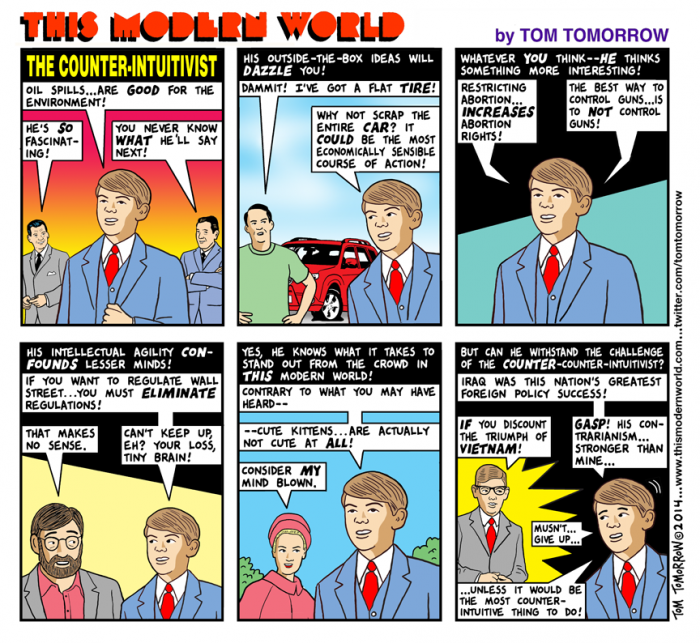The Big Lie is a propaganda technique that involves telling a lie so “colossal” that no one would believe that someone “could have the impudence to distort the truth so infamously.” It works mainly because it is almost impossible to dispute it, because almost anything you can say just lends credence to the lie itself. After all, in order to argue against a lie, you have to tacitly admit that it is something worth a rebuttal.
Lately, the Big Lie has been even more effective, as the media has somehow come to believe that in order to be “fair” and “balanced” you have to consider all opinions, including ones that are pure lies.
Incidentally, I first thought the young person in this comic was supposed to be a slightly older version of Jonathan Krohn, the wunderkind who took the political world by storm at the age of 13 when he wowed ’em at the Conservative Political Action Conference. But it’s not, especially as Krohn gave up being a conservative a few years later.



5 Comments
One of Big Media’s biggest issues for me (at least in politics) is that they consider opinions to be news. They have a person on the left and a person on the right come in and say a bunch of words way more often than they run a story that tells the viewer whether or not left person or right person had bothered to sprinkle any facts in with all their spouting.
This is the problem with the mentality of feigning “fair and balanced” reporting in combination with the idea of “we report, you decide.” If all that’s being reported are declarative statements from partisans, media outlets are abdicating nearly all of their responsibility.
Thatguy, my only disagreement is that I think the problem is not that the media is abdicating their responsibility. It is just that their responsibility has changed, at least in their view. Their responsibility now is to make as much money as possible at as little cost as possible. Partisan arguments, for reasons I can’t fathom, seem to attract lots of viewers, and without any work from the reporters. The only way it will change now is if we stop watching it.
The problem is that it is incredibly difficult to tell the difference between the big lie and the truly counterintuitive. There are plenty of examples in a variety of fields, but particularly the social sciences, where the counterintuitive conclusion is true. Here’s one of my favorite examples (from Predictably Irrational by Dan Arielly): Thinking about your social security number can affect how much money you are willing to spend on various items.
The experiment works like this: Take a group of people and have them right down the last 2 digits of their social security number. Then, show them a collection of items, asking if they would pay that amount in dollars for the item. So, if your SSN ends in 47, would you pay $47 for each item shown? But then the fun starts: Now, show some new items and have everyone write down the maximum amount that they would pay for each item. On average, for every item, people with SSNs that ended with 80-99 were willing to pay DOUBLE the amount those in the 00-19 range would pay.
Counterintuitive results are very common and extremely fascinating. But without expertise or sufficient training in an area, it’s almost impossible to distinguish true counterintuitive results from blatant lies. (Case in point: the whole autism and vaccine discussion.)
So, perhaps IK, the media has abandoned one “responsibility” and replaced it with another. Reading about Ben Bradlee of late reminds me of how dedicated newsmen were to providing information, not opinions, in the Walter Cronkite/Ben Bradlee era. I am so sick of news as talking heads that I’ve become rather selective in where I look for information on events.
Richard Dawkins states it well when he says, “When two opposite points of view are expressed with equal intensity, the truth does not necessarily lie exactly halfway between them. It is possible for one side to be simply wrong.”